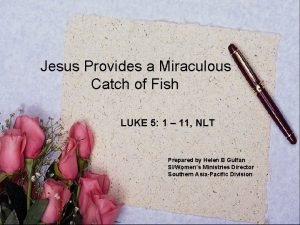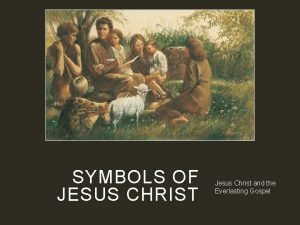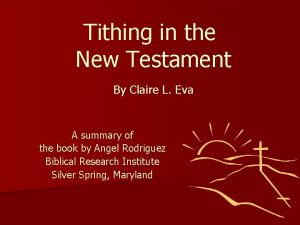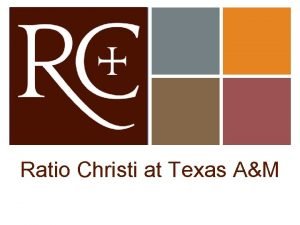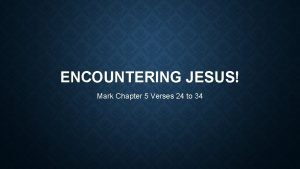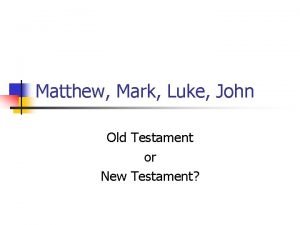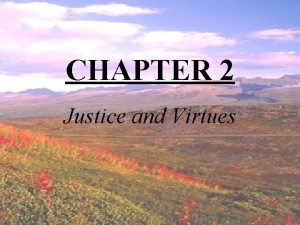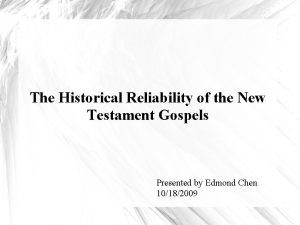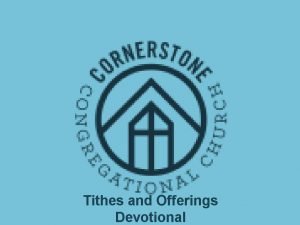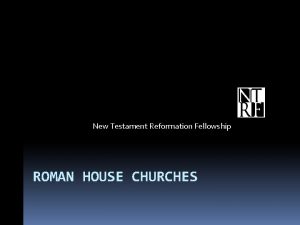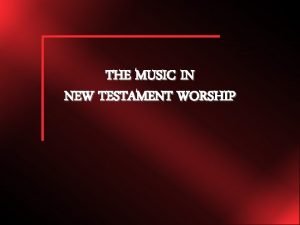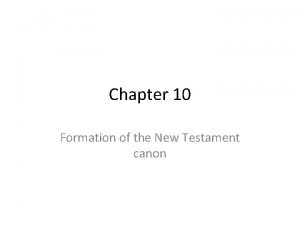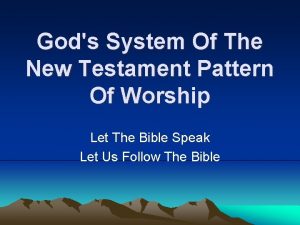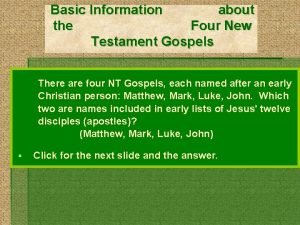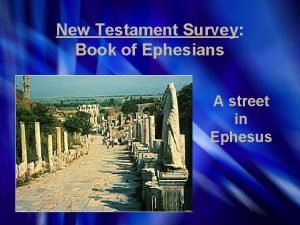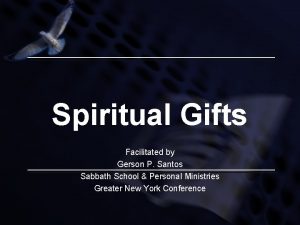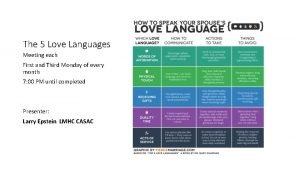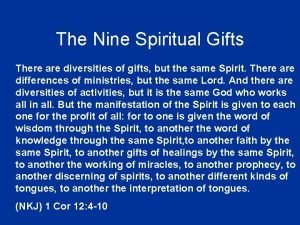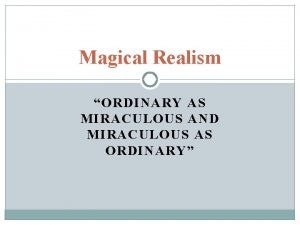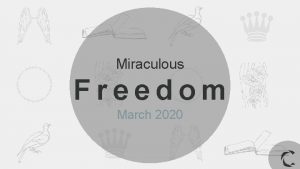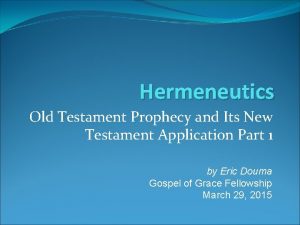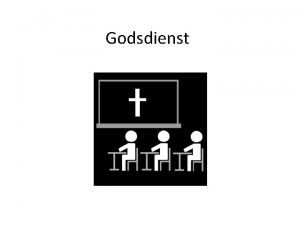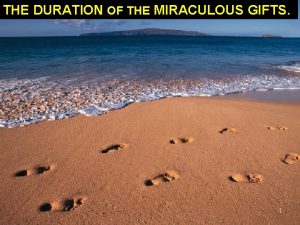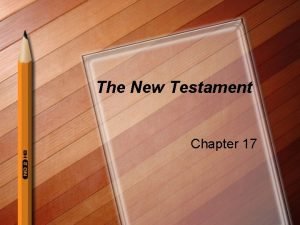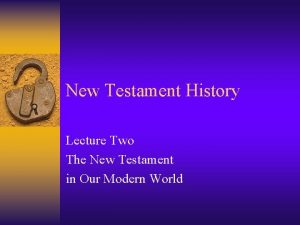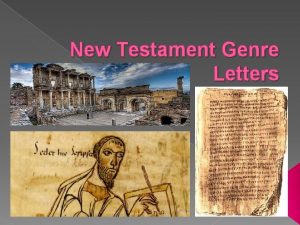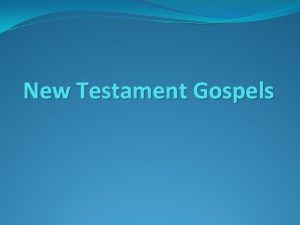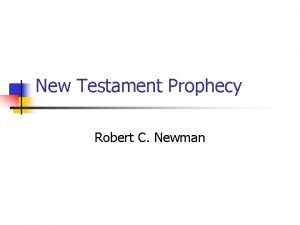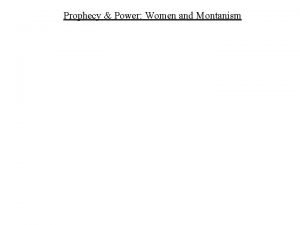Evaluating Miraculous Gifts New Testament Prophecy A New





















![A Comparable Example: The Crucifixion • Acts 2: 23, “Him [Christ], being delivered by A Comparable Example: The Crucifixion • Acts 2: 23, “Him [Christ], being delivered by](https://slidetodoc.com/presentation_image_h/3008fba2fc410b6ab95ca19c922b3d1b/image-22.jpg)











- Slides: 33

Evaluating Miraculous Gifts New Testament Prophecy: A New Understanding

A New View on NT Prophecy • Developed within the Third Wave Charismatic Movement • Held by several key figures, including John Piper • Leading advocate is Wayne Grudem, who has written multiple works on the topic

The Purpose of This Discussion • To introduce you to Grudem’s theory, which has become very influential • To interact with Grudem, coming to an initial assessment of the value of his theory

An Overview of Grudem’s Theory • OT prophets were messengers of God whose words were the very words of God. Their words carried absolute divine authority. • The apostles are the NT equivalent of the OT prophets. They were messengers of Christ whose words were the very words of God. • NT prophecy is a human report of a revelation from God (revelation defined loosely as something God brings to mind).

(It Looks Like This) Old Testament • Prophets—speak God’s word and are absolutely authoritative New Testament • Apostles—speak God’s word and are absolutely authoritative • Prophets—much lower level of authority

Grudem’s Theory, Cont’d. • Church prophecy is lower in value than apostolic revelation. It must be sifted. It may be ignored or even disobeyed. • In Eph. 2: 20 only some prophets are foundational to the church (either the Apostles or the writing prophets) • Even if apostolic revelation is confined to the foundational period of the church, prophecy should be expected to continue to the end of the age.

To a very large extent, Grudem’s theory relies upon the fourth point above: Church prophecy is lower in value than apostolic revelation. It must be sifted. It may be ignored or even disobeyed. Therefore, I want to examine some of Grudem’s proofs.

Instances In Which Prophecy Is Weighed or Sifted • 1 Corinthians 14: 29—”Let the prophets speak two or three, and let the other judge. ” Grudem says the “others” are the members of the congregation, sorting out the useful from the useless. • 1 Thessalonians 5: 20 -21—“Despise not prophesyings. Prove all things; hold fast that which is good. ” Grudem argues that prophecies must contain some things that are more good and some things that are less good.

Instances In Which Prophecy Is Ignored or Disobeyed • 1 Corinthians 14: 30—“If any thing be revealed to another that sitteth by, let the first hold his peace. ” Grudem argues that the message of the first prophet would never be heard and would be lost. • Acts 21: 4—“And finding disciples, we tarried there seven days: who said to Paul through the Spirit, that he should not go up to Jerusalem. ” Grudem says that Paul disobeys this prophecy and goes to Jerusalem anyway.

An Instance In Which Prophecy Is Mistaken • Acts 21: 10 -11—“And as we tarried there many days, there came down from Judaea a certain prophet, named Agabus. And when he was come unto us, he took Paul’s girdle, and bound his own hands and feet, and said, Thus saith the Holy Ghost, So shall the Jews at Jerusalem bind the man that owneth this girdle, and shall deliver him into the hands of the Gentiles. ” • Grudem notes that according to Agabus the Jews would bind Paul and deliver him to the gentiles. • In the event, the Romans rescued Paul from the Jews and bound him later. • The prophecy is generally correct, but mistaken in the details.

What I Appreciate About Grudem • He hopes to allow room for the subjective work and leading of the Holy Spirit (though he chooses to label all subjective leading as “revelation”). • He also wants to guard the sufficiency and uniqueness of Scripture (though he does this by reducing the importance of prophecy). • Grudem interacts well. He listens carefully and kindly to his opponents. He alters his position publicly when he is convinced that he is wrong.

So how do we evaluate Grudem’s proposal?

Issue 1: Is NT prophecy the same as OT prophecy? How is the term being used? • The writings of the early Second Century regard NT prophecy as completely authoritative, on a par with OT prophecy or NT Scripture. These writings are not authoritative, but they are illustrative. • Grudem thinks that Acts 2 is a fulfillment of Joel 2. If so, there is no indication in the book of Acts that OT prophecy or prophets differ at all from NT prophecy or prophets.

Acts 2: 16 -18 16 But this is that which was spoken by the prophet Joel; 17 And it shall come to pass in the last days, saith God, I will pour out of my Spirit upon all flesh: and your sons and your daughters shall prophesy, and your young men shall see visions, and your old men shall dreams: 18 And on my servants and on my handmaidens I will pour out in those days of my Spirit; and they shall prophesy:

Remarks on Acts 2: 14 -16 • I do not regard this as a fulfillment, but as an analogy. • Grudem and his supporters, however, do regard this as a fulfillment. This is crucial to them • If so, then NT prophecy is the fulfillment of Joel’s promise. • That being the case, then NT prophecy has to be understood in the same way that Joel’s readers would understand it, namely, the same thing as OT prophecy.

Here’s a More Accurate Comparison Old Testament • Dispensation Changers: Noah, Moses. They were prophets but much more. New Testament • Dispensation Changers: the apostles. They were prophets but much more. • Prophets: spoke God’s word, absolutely authoritative.

Issue Two: Did NT believers have to weigh and sift prophecies in order to determine their value? • 1 Thess. 5: 21 may not be about prophecy at all. This part of Grudem’s argument is highly questionable. • In 1 Cor. 14: 29 probably does not refer to the church sifting prophecies. It most likely refers to the process of approving the prophets. Once a prophet was approved, what he said would be taken as a word from God. Anything less would be a false prophecy, not a lower-level prophecy. The “others” are either: – A. – B. The other prophets, who examine a new prophet. People who have the gift of discerning spirits.

Issue Three: Were there instances in which NT prophecy could be ignored or even disobeyed? • 1 Cor. 14: 30 does not forbid the interrupted prophet from delivering the rest of his message. It simply restricts the number of speakers to one at a time. The interrupted prophet could resume his prophecy at a later point. • Acts 21: 4 is not clearly a prophecy. In fact, this is a difficult passage on all readings, the sort of passage upon which we should be reluctant to base anything. Most likely this is a personal exhortation based upon the prophecy of Acts 20: 22 -23.

Acts 20: 22 -23 And now, behold, I go bound in the spirit unto Jerusalem, not knowing the things that shall befall me there: Save that the Holy Ghost witnesseth in every city, saying that bonds and afflictions abide me. Acts 21: 4 And finding disciples, we tarried there seven days: who said to Paul through the Spirit, that he should not go up to Jerusalem.

Issue Four: Were there instances in which NT prophecy could contain mistakes? Acts 21: 10 -11 is Agabus’ prophecy And as we tarried there many days, there came down from Judaea a certain prophet, named Agabus. And when he was come unto us, he took Paul’s girdle, and bound his own hands and feet, and said, Thus saith the Holy Ghost, So shall the Jews at Jerusalem bind the man that owneth this girdle, and shall deliver him into the hands of the Gentiles. However, in Acts 22 Paul is rescued from the Jews by a Roman centurion, and later delivered to Felix and Festus by the Roman captain in Jerusalem.

Does this constitute a mistake?
![A Comparable Example The Crucifixion Acts 2 23 Him Christ being delivered by A Comparable Example: The Crucifixion • Acts 2: 23, “Him [Christ], being delivered by](https://slidetodoc.com/presentation_image_h/3008fba2fc410b6ab95ca19c922b3d1b/image-22.jpg)
A Comparable Example: The Crucifixion • Acts 2: 23, “Him [Christ], being delivered by the determinate counsel and foreknowledge of God, ye [Jews] have taken, and by wicked hands have crucified and slain. ” • Is it true that Jesus was crucified by the Jews? Wasn’t he crucified by the Romans? • The principle is that the Jews bear responsibility, even though the immediate act was carried out by someone else. They arranged the crucifixion.

So the question is, Who was responsible for Paul being placed in chains in a Roman (gentile) prison?

We don’t have to speculate. Paul himself gives us the answer.

Acts 28: 17 -19 17 And it came to pass, that after three days Paul called the chief of the Jews together: and when they were come together, he said unto them, Men and brethren, though I have committed nothing against the people, or customs of our fathers, yet was I delivered prisoner from Jerusalem into the hands of the Romans. 18 Who, when they had examined me, would have let me go, because there was no cause of death in me. 19 But when the Jews spake against it, I was constrained to appeal unto Caesar; not that I had ought to accuse my nation of.

What about Agabus’ Prophecy? • • • It is a summary statement. It is using the language of agency. It is designed to fix responsibility. Paul himself confirms its accuracy. Therefore, Agabus is not mistaken and we should not appeal to this example to show that prophecies can contain mistakes.

Issue Five: Which prophets are part of the foundation of the church? • The question revolves around Eph. 2: 20, “And are built upon the foundation of the apostles and prophets, Jesus Christ himself being the chief corner stone. ” • Grudem gives two possible interpretations. • Interpretation one: “Prophets who are apostles. ” The apostles were among the prophets, and they alone are foundational. • Interpretation two: “Prophets who are associated with the apostles. ” Only the writing prophets (who contributed to the NT) were foundational.

Response • Grudem’s interpretation is strained. Even he can’t decide which alternative to favor. • Apostles and Prophets are grammatically and rhetorically parallel, and should normally be taken to refer to distinct groups. • Prophets is pretty clearly inclusive. It refers to all of the NT prophets, not just a select group. • Therefore, all the NT prophets are part of the foundation of the church. This implies the temporary nature of the gift.

Continuing Reservations about Grudem’s Proposal • Two levels of NT prophecy, differing in authority • Bifurcation between OT and NT prophecy, in view of Grudem’s own views on Joel 2 and Acts 2 • The early church’s understanding of prophecy (Didache, Shepherd of Hermas) • The Foundational nature of the prophets • If the above points cannot all be maintained, then Grudem’s case for continuation of prophecy collapses.

What is at stake? Is this a mere quibble? • Grudem significantly redefines revelation and prophecy. • These definitions are inaccurate. • These definitions open doors to other changes, and we are not sure what all of them will be. • Once continuing prophecy is accepted, Grudem and others do want to bring in authoritative content. • This calls into question the sufficiency of Scripture.

Conclusions • Grudem is not an enemy. He is a brother. Grudem does have some valuable concerns. He wants a Christianity of experience, not simply of affirmation. • I am not at all persuaded of the soundness of his arguments. I think he is rather badly mistaken. • The implications of Grudem’s views are significant. This is probably a big mistake rather than a small one.

Accepting a theology is like buying a car. Before you buy it you should look under the hood. You should kick the tires. Before you drive it you should make sure that the brakes work and that it can be stopped before it takes you where you shouldn’t go. You should find out what happens to other people who are testdriving similar cars.

Grudem’s theory appears to have some major malfunctioning parts. I am not at all sure that it will carry the weight that he wants to place on it. I am especially concerned about whether and where it stops. Those who are test-driving his system seem to be going much further than they originally thought. Therefore, while I appreciate many other aspects of Grudem’s thought, I am not close to accepting his views on the continuation of prophecy.
 What is the largest desert in the world?
What is the largest desert in the world? Luke 5:1-11 nlt
Luke 5:1-11 nlt The miraculous year
The miraculous year Todd parker byu
Todd parker byu Tithing in the new testament
Tithing in the new testament New testament canon
New testament canon Encountering jesus in the new testament
Encountering jesus in the new testament John old or new testament
John old or new testament Encountering jesus in the new testament
Encountering jesus in the new testament God-given virtues that direct us to our loving, triune god.
God-given virtues that direct us to our loving, triune god. The historical reliability of the gospels
The historical reliability of the gospels New testament doctrinal mastery
New testament doctrinal mastery Tithe in new testament
Tithe in new testament Titus in the bible summary
Titus in the bible summary Encountering jesus in the new testament
Encountering jesus in the new testament 27 new testament books
27 new testament books Test: the general epistles new testament survey
Test: the general epistles new testament survey Choose life new testament
Choose life new testament House churches in the new testament
House churches in the new testament Music in new testament
Music in new testament The formation of the new testament canon
The formation of the new testament canon New testament pattern of worship
New testament pattern of worship New testament reformation fellowship
New testament reformation fellowship Four new testament gospels
Four new testament gospels Tithe in new testament
Tithe in new testament New testament survey book
New testament survey book Split interest gifts
Split interest gifts What are the 7 spiritual gifts
What are the 7 spiritual gifts Plecak colorissimo
Plecak colorissimo Spirutal gifts
Spirutal gifts Spiritual birthday gifts
Spiritual birthday gifts Gerson gifts
Gerson gifts What are the 7 love languages?
What are the 7 love languages? Vocal gifts of the holy spirit
Vocal gifts of the holy spirit

